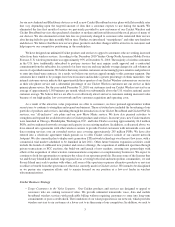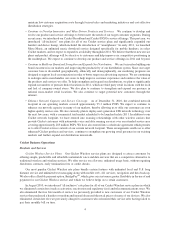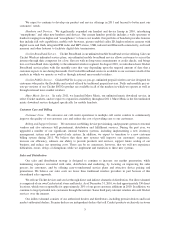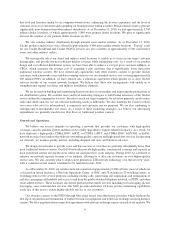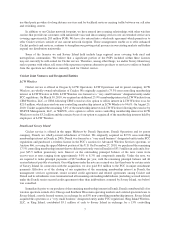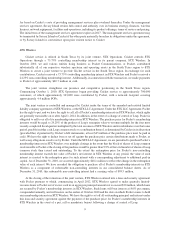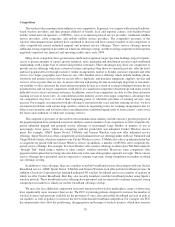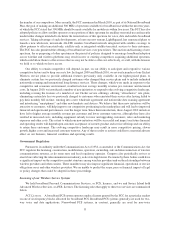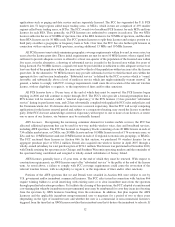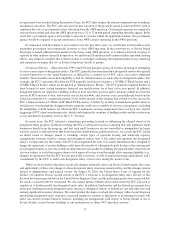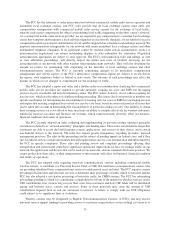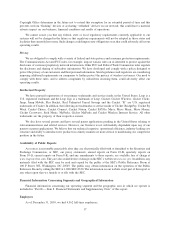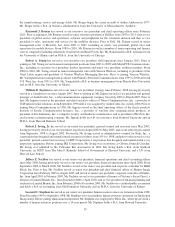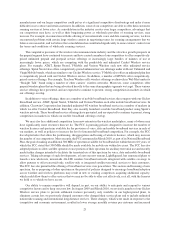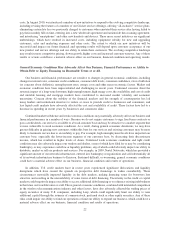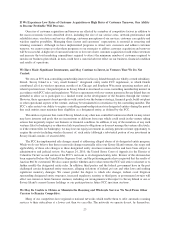Cricket Wireless 2010 Annual Report Download - page 19
Download and view the complete annual report
Please find page 19 of the 2010 Cricket Wireless annual report below. You can navigate through the pages in the report by either clicking on the pages listed below, or by using the keyword search tool below to find specific information within the annual report.no agreement were reached during this period of time, the FCC rules require the non-governmental user to undergo
involuntary relocation. The FCC rules also provide that a portion of the proceeds raised in Auction #66 be used to
reimburse the costs of governmental users relocating from the AWS spectrum. Government agencies are required to
relocate their systems and clear the AWS spectrum over a 12 to 72 month period, depending upon the agency. In the
event that a government agency were unable to relocate its systems within the applicable timeline, the government
agency would be required to accept interference from AWS carriers operating in the AWS spectrum.
In connection with the launch of new markets over the past three years, we and Denali worked with several
incumbent government and commercial licensees to clear AWS spectrum. In the event that we or Savary Island
determine to launch additional new markets in the future using AWS spectrum, or to enhance network coverage or
capacity in other markets currently in operation, we and Savary Island may need to pursue further spectrum clearing
efforts. Any failure to complete these efforts on time or on budget could delay the implementation of any clustering
and expansion strategies that we or Savary Island may decide to pursue.
Designated Entities. Since the early 1990’s the FCC has pursued a policy in wireless licensing of attempting
to assist various types of designated entities. The FCC generally has determined that designated entities who qualify
as small businesses or very small businesses, as defined by a complex set of FCC rules, can receive additional
benefits. These benefits can include eligibility to bid for certain licenses set aside only for designated entities. For
example, the FCC’s spectrum allocation for PCS generally includes two licenses, a 30 MHz C-Block license and a
10 MHz F-Block license, which are designated as “Entrepreneurs’ Blocks.” The FCC generally required holders of
these licenses to meet certain maximum financial size qualifications for at least a five-year period. In addition,
designated entities are eligible for bidding credits in most spectrum auctions and re-auctions (which has been the
case in all PCS auctions to date, and was the case in Auction #66), and, in some cases, an installment loan from the
federal government for a significant portion of the dollar amount of the winning bids (which was the case in the
FCC’s initial auctions of C-Block and F-Block PCS licenses). A failure by an entity to maintain its qualifications to
own licenses won through the designated entity program could cause a number of adverse consequences, including
the ineligibility to hold licenses for which the FCC’s minimum coverage requirements have not been met, and the
triggering of FCC unjust enrichment rules, which could require the recapture of bidding credits and the acceleration
of any installment payments owed to the U.S. Treasury.
In recent years, the FCC initiated a rulemaking proceeding focused on addressing the alleged abuses of its
designated entity program. In that proceeding, the FCC re-affirmed its goals of ensuring that only legitimate small
businesses benefit from the program, and that such small businesses are not controlled or manipulated by larger
wireless carriers or other investors that do not meet the small business qualification tests. As a result, the FCC issued
an initial round of changes aimed at curtailing certain types of spectrum leasing and wholesale capacity
arrangements between wireless carriers and designated entities that it felt called into question the designated
entity’s overall control of the venture. The FCC also lengthened the term of its unjust enrichment rules, designed to
trigger the repayment of auction bidding credits upon the transfer of a designated entity license or the entering into
of a designated entity de facto lease with an entity that does not qualify for bidding. Designated entity structures are
also now subject to a rule that requires them to seek approval for any event that might affect ongoing eligibility (e.g.,
changes in agreements that the FCC has not previously reviewed), as well as annual reporting requirements, and a
commitment by the FCC to audit each designated entity at least once during the license term.
While we do not believe that these recent rule changes materially affect our Savary Island venture, the scope
and applicability of these rule changes to these designated entity structures remain in flux, and the changes remain
subject to administrative and judicial review. On August 24, 2010, the United States Court of Appeals for the
District of Columbia Circuit vacated certain of the FCC’s revisions to its designated entity rules. Review of this
decision has been requested before the United States Supreme Court, and the petitioning parties have requested that
the results of Auction #66 be overturned. We also cannot predict whether and to what extent the FCC will seek to
reinstate or to further modify the designated entity rules. In addition, third parties and the federal government have
in the past challenged certain designated entity structures, alleging violations of federal qui tam and other laws and
seeking significant monetary damages. We cannot predict the degree to which rule changes, federal court litigation
surrounding designated entity structures, increased regulatory scrutiny or third party or government lawsuits will
affect our current or future business ventures, including our arrangements with respect to Savary Island, or our or
Savary Island’s current license holdings or our participation in future FCC spectrum auctions.
13


